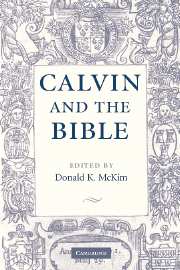Book contents
- Frontmatter
- Contents
- Notes on contributors
- Preface
- List of abbreviations
- 1 Calvin as commentator on Genesis
- 2 Calvin as commentator on the Mosaic Harmony and Joshua
- 3 Calvin as an interpreter of Job
- 4 Calvin as commentator on the Psalms
- 5 Calvin as commentator on the Prophets
- 6 Calvin as commentator on the Synoptic Gospels
- 7 Calvin as commentator on the Gospel of John
- 8 Calvin as commentator on the Acts of the Apostles
- 9 Calvin as commentator on the Pauline epistles
- 10 Calvin as commentator on Hebrews and the Catholic Epistles
- 11 John Calvin as an interpreter of the Bible
- Index
8 - Calvin as commentator on the Acts of the Apostles
Published online by Cambridge University Press: 09 November 2009
- Frontmatter
- Contents
- Notes on contributors
- Preface
- List of abbreviations
- 1 Calvin as commentator on Genesis
- 2 Calvin as commentator on the Mosaic Harmony and Joshua
- 3 Calvin as an interpreter of Job
- 4 Calvin as commentator on the Psalms
- 5 Calvin as commentator on the Prophets
- 6 Calvin as commentator on the Synoptic Gospels
- 7 Calvin as commentator on the Gospel of John
- 8 Calvin as commentator on the Acts of the Apostles
- 9 Calvin as commentator on the Pauline epistles
- 10 Calvin as commentator on Hebrews and the Catholic Epistles
- 11 John Calvin as an interpreter of the Bible
- Index
Summary
“Was Calvin in seiner Auslegung dem Exegete zu bieten hat, ist noch lange nicht verarbeitet und harrt noch einer Fruchtbarmachung für unsere Zeit.”
THE CONTEXT OF THE COMMENTARY
John Calvin worked on Acts both as a commentator as well as a preacher. There is no evidence that Calvin ever lectured on Acts or used this book in the so-called congrégations on Friday mornings. Instead, he preached in the Genevan congregation on Acts during the same period that he was writing his commentary. In the scope of his entire exegetical work, this close coincidence between his sermons and his commentary on the same part of Scripture is unique. From Sunday August 25, 1549 until March 1554 Calvin preached in the morning and occasionally in the afternoon on Acts. On November 10, 1550 – when he had been preaching on Acts for more than a year – he wrote to Farel:
Why do you remind me of Acts and Genesis, embryos hardly yet conceived in the womb? I am ashamed to confess how slowly I am getting on with Acts. I have only done a third of it, and what I have written is so long that I foresee it will be a big volume. I have had to give up Genesis for the time being.
From ex tertia parte, we may conclude that he had more or less explained the first nine chapters. On November 9, 1550, he delivered the thirty-sixth sermon, on Acts 7:37–38.
- Type
- Chapter
- Information
- Calvin and the Bible , pp. 199 - 223Publisher: Cambridge University PressPrint publication year: 2006
- 5
- Cited by



